23 Apr 2018 | Press Releases
A public art project and website celebrating dissent in Cuba and a collective of young bloggers and web activists who give voice to the opinions of young people from all over the Democratic Republic of Congo are among the winners of the 2018 Index on Censorship Freedom of Expression Awards.
The winners, who were announced on Thursday evening at a gala ceremony in London, also include one of the only human rights organisations still operating in Egypt and an investigative journalist from Honduras who regularly risks her life for her right to report on what is happening in the country.
Awards were presented in four categories: arts, campaigning, digital activism and journalism.
The winners are: Cuban art collective The Museum of Dissidence (arts); the Egyptian Commission for Rights and Freedoms (campaigning); Habari RDC, a collective of young Congolese bloggers and activists (digital activism); and Honduran investigative journalist Wendy Funes (journalism).
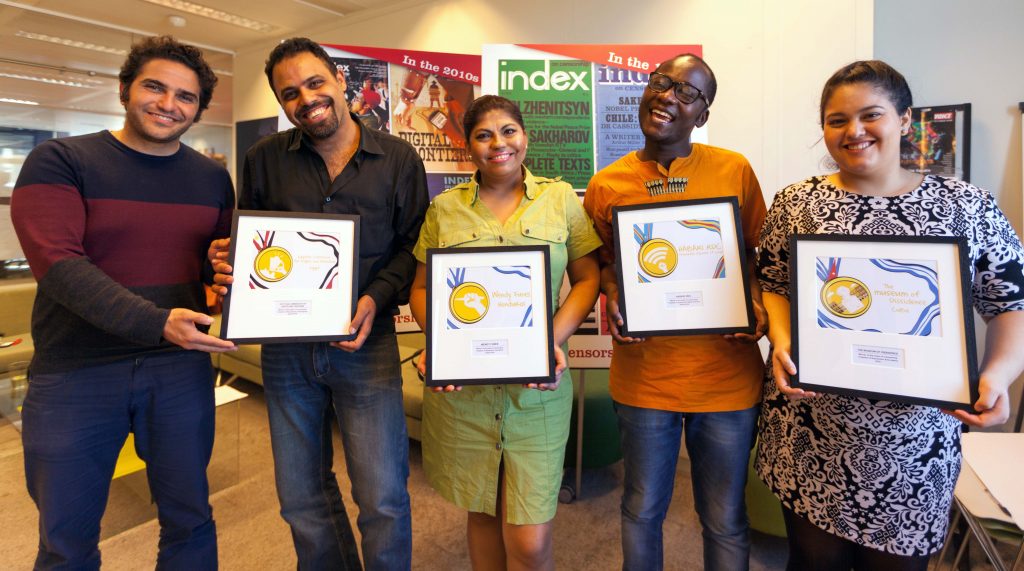
From right: Human rights defenders Mohamed Sameh and Ahmad Abdallah of 2018 Freedom of Expression Campaigning Award-winning Egypt Commission on Rights and Freedoms; 2018 Freedom of Expression Journalism Award-winning Honduran investigative journalist Wendy Funes; Congolese digital activist Guy Muyembe of 2018 Freedom of Expression Digital Activism Award-winning Habari RDC; Perla Hinojosa, Fellowship and Advocacy Officer at Index on Censorship, holds the 2018 Freedom of Expression Arts Award for Cuban arts collective Museum of Dissidence, who could not attend the Freedom of Expression Awards. (Photo: Index on Censorship)
“These winners deserve global recognition for their amazing work,” said Index on Censorship CEO Jodie Ginsberg. “Like all those nominated, they brave massive personal and political hurdles simply so that others can express themselves freely.”
Drawn from more than 400 public nominations, the winners were presented with their awards at a ceremony at The Mayfair Hotel, London, hosted by “stand-up poet” Kate Fox.
Actors, writers and musicians were among those celebrating with the winners. The guest list included The Times columnist and Chair of Index David Aaronovitch, BBC presenter Jonathan Dimbleby, comedian Shazia Mirza, social human rights activists Nimco Ali and Sara Khan, Serpentine Galleries CEO Yana Peel, poet Sabrina Mahfouz, Channel 4’s Lindsey Hilsum and more.
Winners were presented with cartoons created by Khalid Albaih, a Romanian-born Sudanese social media based political cartoonist who considers himself a virtual revolutionist.
Each of the award winners will become part of the fourth cohort of Freedom of Expression Awards fellows. They join last year’s winners — Chinese political cartoonist Rebel Pepper (arts); Russian human rights activist Ildar Dadin (campaigning); Digital collective Turkey Blocks (digital activism); news outlet Maldives Independent and its former editor Zaheena Rasheed (journalism) — as part of a world-class network of campaigners, activists and artists sharing best practices on tackling censorship threats internationally.
Through the fellowship, Index works with the winners – both during an intensive week in London and the rest of the awarding year – to provide longer term, structured support. The goal is to help winners maximise their impact, broaden their support and ensure they can continue to excel at fighting free expression threats on the ground.
This year’s panel of judges included Razia Iqbal, a journalist for BBC News, Tim Moloney QC, deputy head of Doughty Street Chambers, Yana Peel, CEO of the Serpentine Galleries, and Eben Upton CBE, a founder of the Raspberry Pi Foundation and CEO of Raspberry Pi.
Awards judge Eben Upton said: “”The ability to speak freely is a key foundation of democratic society and the rule of law: absent the ability to openly identify the abuse of power, extractive economic conditions, and exclusive political institutions, proliferate. This is why freedom of expression is so precious, and so often under attack from those in power.”
This is the 18th year of the Freedom of Expression Awards. Former winners include activist Malala Yousafzai, cartoonist Ali Ferzat, journalists Anna Politkovskaya and Fergal Keane, and Bahrain Center for Human Rights.
Ziyad Marar, President of Global Publishing at SAGE said: “The protection and promotion of free speech is a belief firmly entrenched within our values at SAGE. As both publisher of the magazine and sponsors of tonight’s awards, we are proud to support Index in their mission as they defend this right globally. We offer our warmest congratulations to those recognised and remain both humbled and awed by their inspirational achievements.”
Further details about the award winners are below.
For interviews with the award winners, who are in London until Friday 20 April, please contact Sean Gallagher at [email protected].
Photographs and other content related to the awards night will be available beginning 11am on Friday 20 April. Please contact Sean Gallagher at [email protected].
Index on Censorship is grateful for the support of the 2018 Freedom of Expression Awards sponsors: SAGE Publishing, Google, Private Internet Access, Edwardian Hotels, Vodafone, Vice News, Doughty Street Chambers and former Index Award-winning Psiphon.
Index on Censorship Freedom of Expression Awards 2018 – background on winners
Arts – The Museum of Dissidence (Cuba)
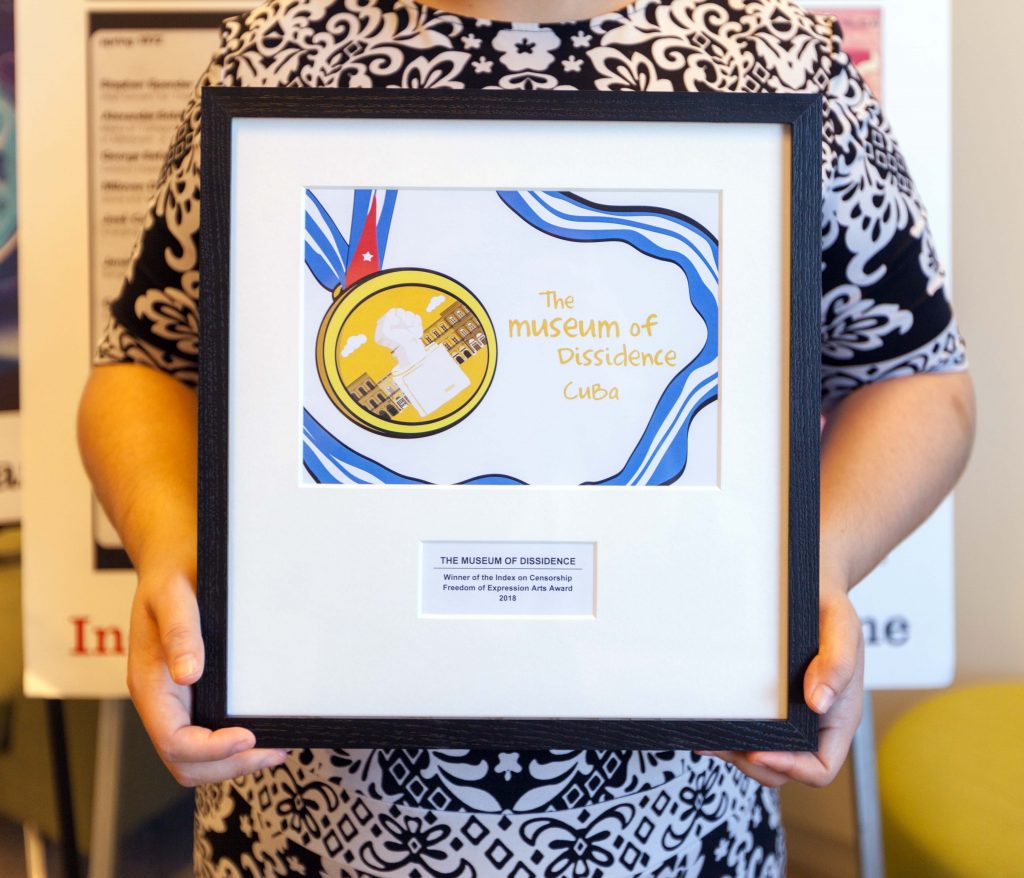
Perla Hinojosa, Fellowship and Advocacy Officer at Index on Censorship, holds the 2018 Freedom of Expression Arts Award for Cuban arts collective Museum of Dissidence, who could not attend the Freedom of Expression Awards. (Photo: Index on Censorship)
The Museum of Dissidence is a public art project and website celebrating dissent in Cuba. Set up in 2016 by acclaimed artist Luis Manuel Otero Alcántara and curator Yanelys Nuñez Leyva, their aim is to reclaim the word “dissident” and give it a positive meaning in Cuba. The museum organises radical public art projects and installations, concentrated in the poorer districts of Havana. Their fearlessness in opening dialogues and inhabiting public space has led to fierce repercussions: Nuñez was sacked from her job and Otero arrested and threatened with prison for being a “counter-revolutionary.” Despite this, they persist in challenging Cuba’s restrictions on expression.
CEO of Serpentine Galleries and 2018 Freedom of Expression Award judge Yana Peel said: The Museum of Dissidence in Cuba is incredibly important for the safe space that it is providing for unsafe ideas. It is a tremendous platform through which the great artists of Cuba bring Cuba to the global stage.”
Profile
Campaigning – The Egyptian Commission for Rights and Freedoms (Egypt). Award supported by Doughty Street Chambers
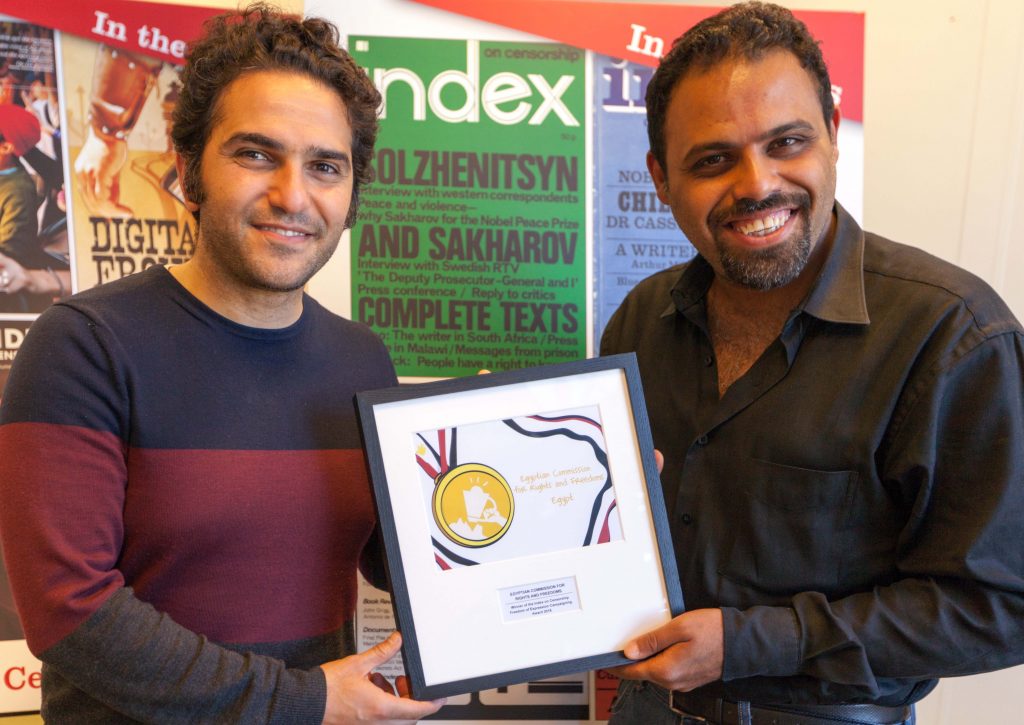
Human rights defenders Mohamed Sameh and Ahmad Abdallah of 2018 Freedom of Expression Campaigning Award-winning Egypt Commission on Rights and Freedoms. (Photo: Index on Censorship)
The Egyptian Commission for Rights and Freedoms is one of the few human rights organisations still operating in a country which has waged an orchestrated campaign against independent civil society groups. Egypt is becoming increasingly hostile to dissent, but ECRF continues to provide advocacy, legal support and campaign coordination, drawing attention to the many ongoing human rights abuses under the autocratic rule of President Abdel Fattah-el-Sisi. Their work has seen them subject to state harassment, their headquarters have been raided and staff members arrested. ECRF are committed to carrying on with their work regardless of the challenges.
CEO of Raspberry Pi and Freedom of Expression Awards 2018 judge Eben Upton said: “In an environment when organisations have had to step back or disappear altogether, they’ve managed to keep going and just that persistence over a period of time in a difficult environment is inspiring”.
Profile
Digital Activism – Habari RDC (Congo). Award sponsored by Private Internet Access
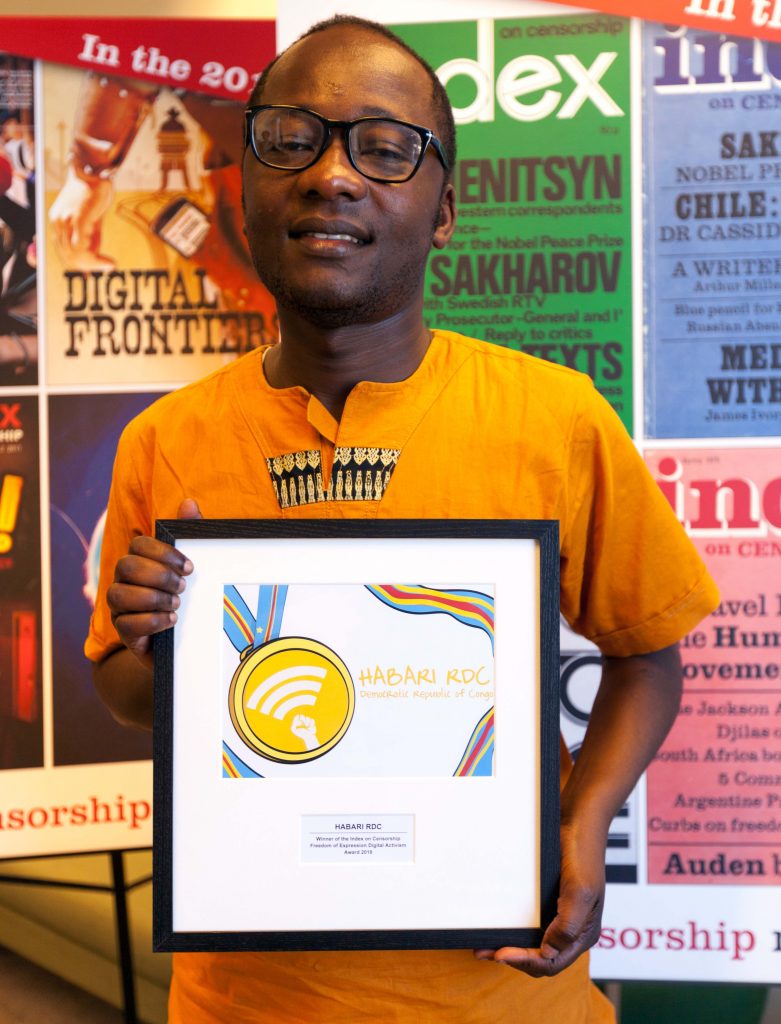
Congolese digital activist Guy Muyembe of 2018 Freedom of Expression Digital Activism Award-winning Habari RDC (Photo: Index on Censorship)
Launched in 2016, Habari RDC is a collective of more than 100 young Congolese bloggers and web activists, who use Facebook, Twitter and YouTube to give voice to the opinions of young people from all over the Democratic Republic of Congo. Their site posts stories and cartoons about politics, but it also covers football, the arts and subjects such as domestic violence, child exploitation, the female orgasm and sexual harassment at work. Habari RDC offers a distinctive collection of funny, angry and modern Congolese voices, who are demanding to be heard.
Journalist and 2018 Freedom of Expression Awards judge Razia Iqbal aid: “They’re doing something which is actually very hard to do, which is make sure that the future generation know what’s happening in their own country, are willing to speak to each other about it and be active politically”.
Profile
Journalism – Wendy Funes (Honduras). Award sponsored by VICE News
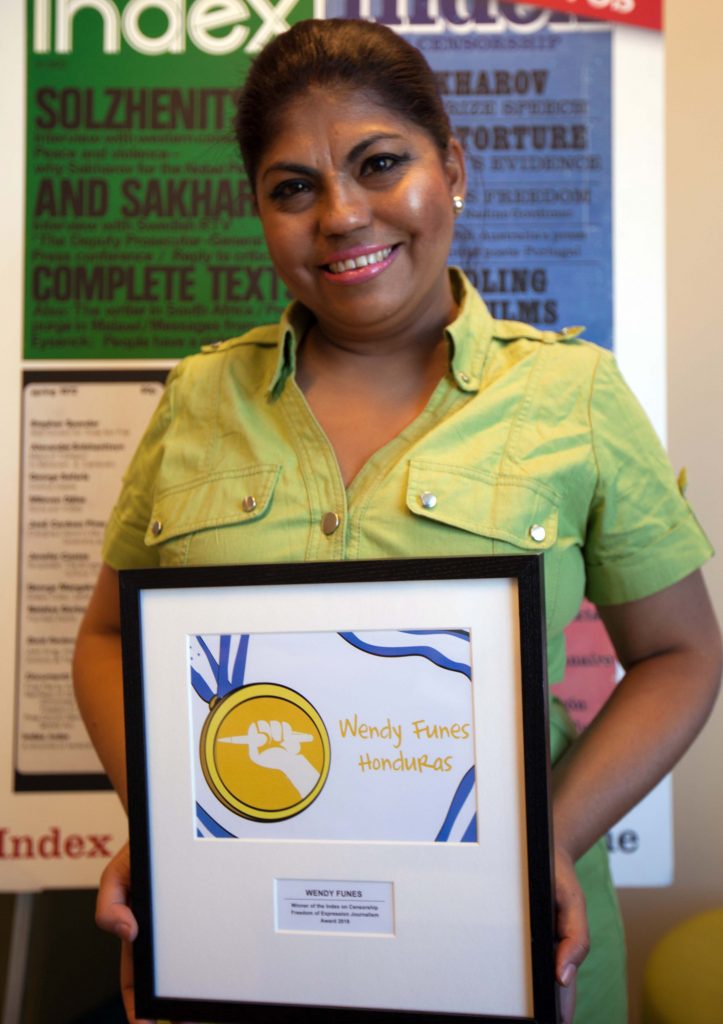
2018 Freedom of Expression Journalism Award-winning Honduran investigative journalist Wendy Funes. (Photo: Index on Censorship)
Wendy Funes is an investigative journalist from Honduras who regularly risks her life for her right to report on what is happening in the country, an extremely harsh environment for reporters. Two journalists were murdered in 2017 and her father and friends are among those who have met violent deaths in the country – killings for which no one has ever been brought to justice. Funes meets these challenges with creativity and determination. For one article she had her own death certificate issued to highlight corruption. Funes also writes about violence against women, a huge problem in Honduras where one woman is killed every 16 hours.
Journalist and 2018 Freedom of Expression Awards judge Razia Iqbal QC said: “She is courageous in the face of death threats. She is courageous in the face of censorship. She is courageous just in terms of getting up every morning and saying I’m going to continue to do what I am doing.”
Profile
ABOUT THE FREEDOM OF EXPRESSION AWARDS AND FELLOWSHIP
The Index on Censorship Freedom of Expression Awards recognise those individuals and groups making the greatest impact in tackling censorship worldwide. Established 18 years ago, the awards shine a light on work being undertaken in defence of free expression globally. Often these stories go unnoticed or are ignored by the mainstream press. Through the fellowship, Index works with the winners – both during an intensive week in London and the rest of the awarding year – to provide longer term, structured support. The goal is to help winners maximise their impact, broaden their support and ensure they can continue to excel at fighting free expression threats on the ground.
ABOUT INDEX ON CENSORSHIP
Index on Censorship is a UK-based nonprofit that campaigns against censorship and promotes free expression worldwide. Founded in 1972, Index has published some of the world’s leading writers and artists in its award-winning quarterly magazine, including Nadine Gordimer, Mario Vargas Llosa, Samuel Beckett and Kurt Vonnegut. Index promotes debate, monitors threats to free speech and supports individuals through its annual awards and fellowship program.
23 Apr 2018 | Awards, Digital Freedom
[vc_row][vc_column][vc_video link=”https://youtu.be/Cc3K8Bcvt6Y”][vc_column_text]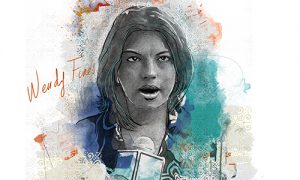 Wendy Funes is an investigative journalist from Honduras who regularly risks her life for her right to report on what is happening in the country, an extremely harsh environment for reporters. Two journalists were murdered in 2017 and her father and friends are among those who have met violent deaths in the country – killings for which no one has ever been brought to justice. Funes meets these challenges with creativity and determination. For one article she had her own death certificate issued to highlight corruption. Funes also writes about violence against women, a huge problem in Honduras where one woman is killed every 16 hours.[/vc_column_text][/vc_column][/vc_row][vc_row][vc_column][awards_fellows years=”2018″][vc_basic_grid post_type=”post” max_items=”12″ style=”load-more” items_per_page=”4″ element_width=”6″ grid_id=”vc_gid:1524476008020-fceb892e-6e72-0″ taxonomies=”23255″][/vc_column][/vc_row]
Wendy Funes is an investigative journalist from Honduras who regularly risks her life for her right to report on what is happening in the country, an extremely harsh environment for reporters. Two journalists were murdered in 2017 and her father and friends are among those who have met violent deaths in the country – killings for which no one has ever been brought to justice. Funes meets these challenges with creativity and determination. For one article she had her own death certificate issued to highlight corruption. Funes also writes about violence against women, a huge problem in Honduras where one woman is killed every 16 hours.[/vc_column_text][/vc_column][/vc_row][vc_row][vc_column][awards_fellows years=”2018″][vc_basic_grid post_type=”post” max_items=”12″ style=”load-more” items_per_page=”4″ element_width=”6″ grid_id=”vc_gid:1524476008020-fceb892e-6e72-0″ taxonomies=”23255″][/vc_column][/vc_row]
19 Apr 2018 | Awards, News and features
[vc_row][vc_column][vc_video link=”https://www.youtube.com/playlist?list=PLlUhPA3TuB57QMClBRit7rIZOSam_Orbm”][vc_column_text]A public art project and website celebrating dissent in Cuba and a collective of young bloggers and web activists who give voice to the opinions of young people from all over the Democratic Republic of Congo are among the winners of the 2018 Index on Censorship Freedom of Expression Awards.
The winners, who were announced on Thursday evening at a gala ceremony in London, also include one of the only human rights organisations still operating in Egypt and an investigative journalist from Honduras who regularly risks her life for her right to report on what is happening in the country.
Awards were presented in four categories: arts, campaigning, digital activism and journalism.
The winners are: Cuban art collective The Museum of Dissidence (arts); the Egyptian Commission for Rights and Freedoms (campaigning); Habari RDC, a collective of young Congolese bloggers and activists (digital activism); and Honduran investigative journalist Wendy Funes (journalism).
“These winners deserve global recognition for their amazing work,” said Index on Censorship CEO Jodie Ginsberg. “Like all those nominated, they brave massive personal and political hurdles simply so that others can express themselves freely.”
Drawn from more than 400 public nominations, the winners were presented with their awards at a ceremony at The Mayfair Hotel, London, hosted by “stand-up poet” Kate Fox.
Actors, writers and musicians were among those celebrating with the winners. The guest list included The Times columnist and chair of Index David Aaronovitch, BBC presenter Jonathan Dimbleby, philosopher AC Grayling, TV journalist Trevor Phillips, lead commissioner for the Commission for Countering Extremism Sara Khan, Serpentine Galleries CEO Yana Peel, poet Sabrina Mahfouz, cartoonist Martin Rowson, founder of the Swedish Pirate Party Rick Falkvinge and more.
Winners were presented with cartoons created by Khalid Albaih, a Romanian-born Sudanese social media based political cartoonist who considers himself a virtual revolutionist.

Each of the award winners will become part of the fourth cohort of Freedom of Expression Awards fellows. They join last year’s winners — Chinese political cartoonist Rebel Pepper (arts); Russian human rights activist Ildar Dadin (campaigning); Digital collective Turkey Blocks (digital activism); news outlet Maldives Independent and its former editor Zaheena Rasheed (journalism) — as part of a world-class network of campaigners, activists and artists sharing best practices on tackling censorship threats internationally.
Through the fellowship, Index works with the winners – both during an intensive week in London and the rest of the awarding year – to provide longer term, structured support. The goal is to help winners maximise their impact, broaden their support and ensure they can continue to excel at fighting free expression threats on the ground.
This year’s panel of judges included Razia Iqbal, a journalist for BBC News, Tim Moloney QC, deputy head of Doughty Street Chambers, Yana Peel, CEO of the Serpentine Galleries, and Eben Upton CBE, a founder of the Raspberry Pi Foundation and CEO of Raspberry Pi.
Awards judge Eben Upton said: “”The ability to speak freely is a key foundation of democratic society and the rule of law: absent the ability to openly identify the abuse of power, extractive economic conditions, and exclusive political institutions, proliferate. This is why freedom of expression is so precious, and so often under attack from those in power.
This is the 18th year of the Freedom of Expression Awards. Former winners include activist Malala Yousafzai, cartoonist Ali Ferzat, journalists Anna Politkovskaya and Fergal Keane, and Bahrain Center for Human Rights.
Ziyad Marar, President of Global Publishing at SAGE said: “The protection and promotion of free speech is a belief firmly entrenched within our values at SAGE. As both publisher of the magazine and sponsors of tonight’s awards, we are proud to support Index in their mission as they defend this right globally. We offer our warmest congratulations to those recognised and remain both humbled and awed by their inspirational achievements.”[/vc_column_text][vc_single_image image=”99882″ img_size=”full” add_caption=”yes” alignment=”center”][/vc_column][/vc_row][vc_row full_width=”stretch_row_content_no_spaces”][vc_column][vc_single_image image=”99874″ img_size=”full” add_caption=”yes” alignment=”center”][/vc_column][/vc_row][vc_row][vc_column][vc_custom_heading text=”2018 Freedom of Expression Arts Award ” font_container=”tag:h3|text_align:center” use_theme_fonts=”yes”][vc_single_image image=”99814″ img_size=”full” add_caption=”yes” alignment=”center”][vc_column_text]The Museum of Dissidence, Cuba
The Museum of Dissidence is a public art project and website celebrating dissent in Cuba. Set up in 2016 by acclaimed artist Luis Manuel Otero Alcántara and curator Yanelys Nuñez Leyva, their aim is to reclaim the word “dissident” and give it a positive meaning in Cuba. The museum organises radical public art projects and installations, concentrated in the poorer districts of Havana. Their fearlessness in opening dialogues and inhabiting public space has led to fierce repercussions: Nuñez was sacked from her job and Otero arrested and threatened with prison for being a “counter-revolutionary.” Despite this, they persist in challenging Cuba’s restrictions on expression.
Speech: The Museum of Dissidence: “Freedom of expression is an integral part of all societies”
Profile: Museum of Dissidence creators remain fiercely loyal to their project[/vc_column_text][/vc_column][/vc_row][vc_row][vc_column][vc_custom_heading text=”2018 Freedom of Expression Campaigning Award ” font_container=”tag:h3|text_align:center” use_theme_fonts=”yes”][vc_single_image image=”99880″ img_size=”full” add_caption=”yes” alignment=”center”][vc_column_text]Egyptian Commission for Rights and Freedoms, Egypt
The Egyptian Commission for Rights and Freedoms is one of the few human rights organisations still operating in a country which has waged an orchestrated campaign against independent civil society groups. Egypt is becoming increasingly hostile to dissent, but ECRF continues to provide advocacy, legal support and campaign coordination, drawing attention to the many ongoing human rights abuses under the autocratic rule of President Abdel Fattah-el-Sisi. Their work has seen them subject to state harassment, their headquarters have been raided and staff members arrested. ECRF are committed to carrying on with their work regardless of the challenges.
Speech: ECRF: “No matter how dark is the moment, love and hope are always possible”
Profile: Egytian Commission for Rights and Freedom advocates for a democratic Egypt[/vc_column_text][/vc_column][/vc_row][vc_row][vc_column][vc_custom_heading text=”2018 Freedom of Expression Digital Activism Award ” font_container=”tag:h3|text_align:center” use_theme_fonts=”yes”][vc_single_image image=”99888″ img_size=”full” add_caption=”yes” alignment=”center”][vc_column_text]Habari RDC, Congo
Launched in 2016, Habari RDC is a collective of more than 100 young Congolese bloggers and web activists, who use Facebook, Twitter and YouTube to give voice to the opinions of young people from all over the Democratic Republic of Congo. Their site posts stories and cartoons about politics, but it also covers football, the arts and subjects such as domestic violence, child exploitation, the female orgasm and sexual harassment at work. Habari RDC offers a distinctive collection of funny, angry and modern Congolese voices, who are demanding to be heard.
Speech: Guy Muyembe of Habari RDC: “Great is my joy on this day to receive this award on behalf of the Congolese blogging community”
Profile: Habari RDC merges young political minds to fight injustice online[/vc_column_text][/vc_column][/vc_row][vc_row][vc_column][vc_custom_heading text=”2018 Freedom of Expression Journalism Award ” font_container=”tag:h3|text_align:center” use_theme_fonts=”yes”][vc_single_image image=”99885″ img_size=”full” add_caption=”yes” alignment=”center”][vc_column_text]Wendy Funes, Honduras
Wendy Funes is an investigative journalist from Honduras who regularly risks her life for her right to report on what is happening in the country, an extremely harsh environment for reporters. Two journalists were murdered in 2017 and her father and friends are among those who have met violent deaths in the country – killings for which no one has ever been brought to justice. Funes meets these challenges with creativity and determination. For one article she had her own death certificate issued to highlight corruption. Funes also writes about violence against women, a huge problem in Honduras where one woman is killed every 16 hours.
Speech: “I dedicate this prize to my fellow people of Honduras”
Profile: Wendy Funes fearlessly pursues investigative journalism in Honduras[/vc_column_text][/vc_column][/vc_row][vc_row][vc_column][vc_custom_heading text=”Jodie Ginsberg: “Let’s speak loudly together and lift up the voices not just of Yanelys and Luis, Wendy, Guy and Ahmad but all those fighting to speak freely“” font_container=”tag:h3|text_align:center” use_theme_fonts=”yes”][vc_single_image image=”99892″ img_size=”full” add_caption=”yes” alignment=”center”][vc_column_text]In the last four years as head of Index I have used various ways to describe this organisation, but a friend hit it on the head earlier this week when she emailed about a vigil she was organising in London. “Index,” she said “please don’t forget to bring your megaphone.”
And that’s us. That’s what we do. Index brings the megaphone. Both literally and metaphorically.
We amplify the voices of those facing censorship – by publishing their work, by campaigning on their behalf, and by supporting them through initiative like the awards fellowship. And we amplify the cause of freedom of expression by promoting debate about it.
Why do we do it?
We do it because we believe freedom of expression is not just a fundamental freedom, but thefundamental freedom. The one on which all others are based. Without freedom of expression how do we begin to articulate our desire for all other freedoms – the freedom to love whomever we choose, to express our faith – or lack of it – or our political beliefs. Freedom of expression allows us to test our ideas, posit our opinions – and to have those ideas and opinions tested. Freedom of expression is not a freedom that benefits only the powerful and privileged. It is what allows us to hold them to account. Free speech has been at the heart of resistance and reform movements since time immemorial. From women’s suffrage to gay rights. As civil rights activist and US congressman John Lewis observed: “Without freedom of speech and the right to dissent, the Civil Rights movement would have been a bird without wings.”
Full speech
[/vc_column_text][/vc_column][/vc_row][vc_row][vc_column][vc_column_text]
[/vc_column_text][vc_media_grid grid_id=”vc_gid:1524470042671-7220572a-a0cb-9″ include=”99937,99935,99936,99933,99931,99932,99930,99928,99929,99927,99925,99926,99924,99923,99922,99921,99920,99919,99918,99917,99916,99915,99914,99913,99912,99911,99910,99909,99908,99907,99906,99905,99904,99903,99902″][/vc_column][/vc_row][vc_row][vc_column][vc_basic_grid post_type=”post” max_items=”12″ style=”load-more” items_per_page=”4″ element_width=”6″ grid_id=”vc_gid:1524470042687-513f86c4-3062-0″ taxonomies=”8935, 8734″][/vc_column][/vc_row][vc_row][vc_column][vc_column_text]Index on Censorship is grateful for the support of the 2018 Freedom of Expression Awards sponsors: SAGE Publishing, Google, Private Internet Access, Edwardian Hotels, Vodafone, Vice News, Doughty Street Chambers and former Index Award-winning Psiphon.[/vc_column_text][/vc_column][/vc_row]
19 Apr 2018 | Awards, News and features
[vc_row][vc_column][vc_column_text]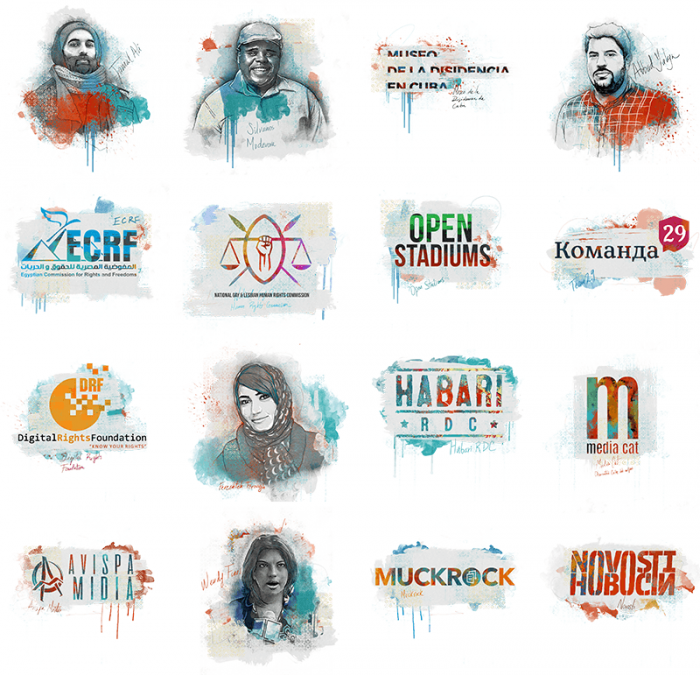
Each year, the Index on Censorship Freedom of Expression Awards gala honours courageous champions who fight for free speech around the world.
Drawn from more than 400 crowdsourced nominations, this year’s nominees include artists, journalists, campaigners and digital activists tackling censorship and fighting for freedom of expression. Many of the 16 shortlisted are regularly targeted by authorities or by criminal and extremist groups for their work: some face regular death threats, others criminal prosecution.
The gala takes place on Thursday 19 April in London and will be hosted by stand-up poet Kate Fox.
We will be live tweeting throughout the evening on @IndexCensorship. Get involved in the conversation using the hashtag #IndexAwards2018. Listen LIVE beginning at 7:30pm BST on Resonance FM
Index on Censorship Freedom of Expression Awards nominees 2018
Arts

Jamal Ali, Azerbaijan
Jamal Ali is an exiled rap musician with a history of challenging Azerbaijan’s authoritarian regime. Ali was one of many who took to the streets in 2012 to protest spending around the country’s hosting of the Eurovision song contest. Detained and tortured for his role in the protests, he went into exile after his life was threatened. Ali has persisted in challenging the government by releasing music critical of the country’s dynastic leadership. Following the release of one song, Ali’s mother was arrested in a senseless display of aggression. In provoking such a harsh response with a single action, Ali has highlighted the repressive nature of the regime and its ruthless desire to silence all dissent.
Full profile
Silvanos Mudzvova, Zimbabwe
Playwright and activist Silvanos Mudzvova uses performance to protest against the repressive regime of recently toppled President Robert Mugabe and to agitate for greater democracy and rights for his country’s LGBT community. Mudzvova specialises in performing so-called “hit-and-run” actions in public places to grab the attention of politicians and defy censorship laws, which forbid public performances without police clearance. His activism has seen him be traumatically abducted: taken at gunpoint from his home he was viciously tortured with electric shocks. Nonetheless, Mudzvova has resolved to finish what he’s started and has been vociferous about the recent political change in Zimbabwe.
Full profile
The Museum of Dissidence, Cuba
The Museum of Dissidence is a public art project and website celebrating dissent in Cuba. Set up in 2016 by acclaimed artist Luis Manuel Otero Alcántara and curator Yanelys Nuñez Leyva, their aim is to reclaim the word “dissident” and give it a positive meaning in Cuba. The museum organises radical public art projects and installations, concentrated in the poorer districts of Havana. Their fearlessness in opening dialogues and inhabiting public space has led to fierce repercussions: Nuñez was sacked from her job and Otero arrested and threatened with prison for being a “counter-revolutionary.” Despite this, they persist in challenging Cuba’s restrictions on expression.
Full profile
Abbad Yahya, Palestine
Abbad Yahya is a Palestinian author whose novel, Crime in Ramallah, was banned by the Palestinian Authority in 2017. The book tackles taboo issues such as homosexuality, fanaticism and religious extremism. It provoked a rapid official response and all copies of the book were seized. The public prosecutor issued a summons for questioning against Yahya while the distributor of the novel was arrested and interrogated. Yahya also received threats and copies of the book were burned. Despite this, he has spent the last year raising awareness of freedom of expression and the lives of young people in the West Bank and Gaza, particularly in relation to their sexuality.
Full profile
Campaigning

Egyptian Commission for Rights and Freedoms, Egypt
The Egyptian Commission for Rights and Freedoms is one of the few human rights organisations still operating in a country which has waged an orchestrated campaign against independent civil society groups. Egypt is becoming increasingly hostile to dissent, but ECRF continues to provide advocacy, legal support and campaign coordination, drawing attention to the many ongoing human rights abuses under the autocratic rule of President Abdel Fattah-el-Sisi. Their work has seen them subject to state harassment, their headquarters have been raided and staff members arrested. ECRF are committed to carrying on with their work regardless of the challenges.
Full profile
National Gay and Lesbian Human Rights Commission, Kenya
The National Gay and Lesbian Human Rights Commission is the only organisation in Kenya challenging and preventing LGBTI discrimination through the country’s courts. Even though homosexuality isn’t illegal in Kenya, homosexual acts are. Homophobia is commonplace and men who have sex with men can be punished by up to 14 years in prison, and while no specific laws relate to women, former Prime Minister Raila Odinga has said lesbians should also be imprisoned. NGLHRC has had an impact by successfully lobbying MPs to scrap a proposed anti-homosexuality bill and winning agreement from the Kenya Medical Association to stop forced anal examination of clients.
Full profile
Open Stadiums, Iran
The women behind Open Stadiums risk their lives to assert a woman’s right to attend public sporting events in Iran. The campaign challenges the country’s political and religious regime, and engages women in an issue many human rights activists have previously thought unimportant. Iranian women face many restrictions on using public space. Open Stadiums has generated broad support for their cause in and out of the country. As a result, MPs and people in power are beginning to talk about women’s rights to attend sporting events in a way that would have been taboo before.
Full profile
Team 29, Russia
Team 29 is an association of lawyers and journalists that defends those targeted by the state for exercising their right to freedom of speech in Russia. It is crucial work in a climate where hundreds of civil society organisations have been forced to close and where increasingly tight restrictions have been placed on public protest and political dissent since mass demonstrations rocked Russia in 2012. Team 29 conducts about 50 court cases annually, many involving accusations of high treason. Aside from litigation, they offer legal guides for activists and advice on what to do when summoned by state security for interrogation.
Full profile
Digital Activism

Digital Rights Foundation, Pakistan
In late 2016, the Digital Rights Foundation established a cyber-harassment helpline that supported more than a thousand women in its first year of operation alone. Women make up only about a quarter of the online population in Pakistan but routinely face intense bullying including the use of revenge porn, blackmail, and other kinds of harassment. Often afraid to report how badly they are treated, women react by withdrawing from online spaces. To counter this, DRF’s Cyber Harassment Helpline team includes a qualified psychologist, digital security expert, and trained lawyer, all of whom provide specialised assistance.
Full profile
Fereshteh Forough, Afghanistan
Fereshteh Forough is the founder and executive director of Code to Inspire, a coding school for girls in Afghanistan. Founded in 2015, this innovative project helps women and girls learn computer programming with the aim of tapping into commercial opportunities online and fostering economic independence in a country that remains a highly patriarchal and conservative society. Forough believes that with programming skills, an internet connection and using bitcoin for currency, Afghan women can not only create wealth but challenge gender roles and gain independence.
Full profile
Habari RDC, Congo
Launched in 2016, Habari RDC is a collective of more than 100 young Congolese bloggers and web activists, who use Facebook, Twitter and YouTube to give voice to the opinions of young people from all over the Democratic Republic of Congo. Their site posts stories and cartoons about politics, but it also covers football, the arts and subjects such as domestic violence, child exploitation, the female orgasm and sexual harassment at work. Habari RDC offers a distinctive collection of funny, angry and modern Congolese voices, who are demanding to be heard.
Full profile
Mèdia.cat, Spain
Mèdia.cat is a Catalan website devoted to highlighting media freedom violations and investigating under-reported stories. Unique in Spain, it was a particularly significant player in 2017 when the disputed independence referendum brought issues of censorship and the impartiality of news under the spotlight. The website provides an online platform that systematically catalogues censorship perpetrated in the region. Its map on censorship offers a way for journalists to report on abuses they have personally suffered.
Journalism

Avispa Midia, Mexico
Avispa Midia is an independent online magazine that prides itself on its use of multimedia techniques to bring alive the political, economic and social worlds of Mexico and Latin America. It specialises in investigations into organised crime and the paramilitaries behind mining mega-projects, hydroelectric dams and the wind and oil industry. Many of Avispa’s reports in the last 12 months have been focused on Mexico and Central America, where the media group has helped indigenous and marginalised communities report on their own stories through audio and video training.
Wendy Funes, Honduras
Wendy Funes is an investigative journalist from Honduras who regularly risks her life for her right to report on what is happening in the country, an extremely harsh environment for reporters. Two journalists were murdered in 2017 and her father and friends are among those who have met violent deaths in the country – killings for which no one has ever been brought to justice. Funes meets these challenges with creativity and determination. For one article she had her own death certificate issued to highlight corruption. Funes also writes about violence against women, a huge problem in Honduras where one woman is killed every 16 hours.
MuckRock, United States
MuckRock is a non-profit news site used by journalists, activists and members of the public to request and share US government documents in pursuit of more transparency. MuckRock has shed light on government surveillance, censorship and police militarisation among other issues. MuckRock produces its own reporting, and helps others learn more about requesting information. Last year the site produced a Freedom of Information Act 4 Kidz lesson plan to help educators to start discussions about government transparency. Since then, they have expanded their reach to Canada. The organisation hopes to continue increasing their impact by putting transparency tools in the hands of journalists, researchers and ordinary citizens.
Novosti, Croatia
Novosti is a weekly Serbian-language magazine in Croatia. Although fully funded as a Serb minority publication by the Serbian National Council, it deals with a whole range of topics, not only those directly related to the minority status of Croatian Serbs. In the past year, the outlet’s journalists have faced attacks and death threats mainly from the ultra-conservative far-right. For its reporting, the staff of Novosti have been met with protest under the windows of the magazine’s offices shouting fascist slogans and anti-Serbian insults, and told they would end up killed like Charlie Hebdo journalists. Despite the pressure, the weekly persists in writing the truth and defending freedom of expression.[/vc_column_text][/vc_column][/vc_row][vc_row][vc_column][vc_basic_grid post_type=”post” max_items=”12″ style=”load-more” items_per_page=”4″ element_width=”6″ grid_id=”vc_gid:1524073803130-58a2be32-5f5a-7″ taxonomies=”8935″][/vc_column][/vc_row]






 Wendy Funes is an investigative journalist from Honduras who regularly risks her life for her right to report on what is happening in the country, an extremely harsh environment for reporters. Two journalists were murdered in 2017 and her father and friends are among those who have met violent deaths in the country – killings for which no one has ever been brought to justice. Funes meets these challenges with creativity and determination. For one article she had her own death certificate issued to highlight corruption. Funes also writes about violence against women, a huge problem in Honduras where one woman is killed every 16 hours.[/vc_column_text][/vc_column][/vc_row][vc_row][vc_column][awards_fellows years=”2018″][vc_basic_grid post_type=”post” max_items=”12″ style=”load-more” items_per_page=”4″ element_width=”6″ grid_id=”vc_gid:1524476008020-fceb892e-6e72-0″ taxonomies=”23255″][/vc_column][/vc_row]
Wendy Funes is an investigative journalist from Honduras who regularly risks her life for her right to report on what is happening in the country, an extremely harsh environment for reporters. Two journalists were murdered in 2017 and her father and friends are among those who have met violent deaths in the country – killings for which no one has ever been brought to justice. Funes meets these challenges with creativity and determination. For one article she had her own death certificate issued to highlight corruption. Funes also writes about violence against women, a huge problem in Honduras where one woman is killed every 16 hours.[/vc_column_text][/vc_column][/vc_row][vc_row][vc_column][awards_fellows years=”2018″][vc_basic_grid post_type=”post” max_items=”12″ style=”load-more” items_per_page=”4″ element_width=”6″ grid_id=”vc_gid:1524476008020-fceb892e-6e72-0″ taxonomies=”23255″][/vc_column][/vc_row]




